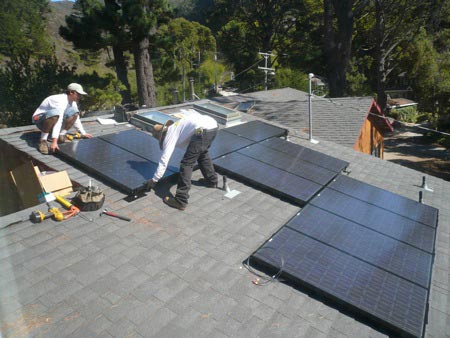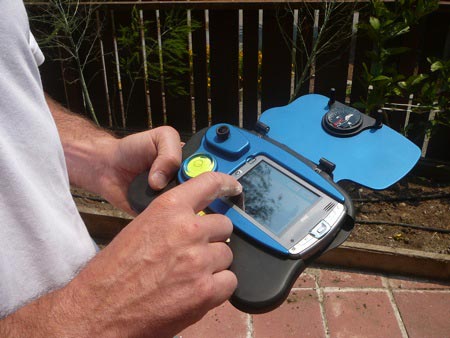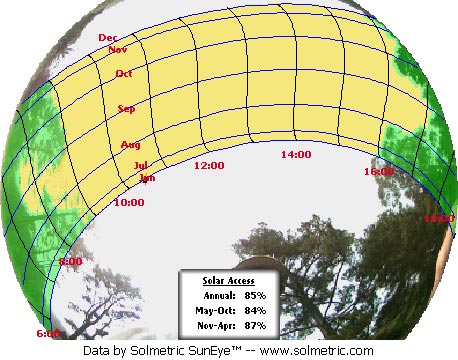Sent to you by mchunkat via Google Reader:

The cool tool here is creative solar financing. Solar-electric panels are pretty much a commodity, but still high priced. What's new is an innovative way for a homeowner to afford an expensive solar set up. Nine months ago I covered my studio roof with 5 kilowatts of solar panels financed by a solar company. We are generating about 85% of the electricity we use now. Here's how it works.
You sign up with a company that installs high-quality panels on your property for no money down. Zero dollars! On sunny days the panels make electrons which run your meter backwards. The quantity of panels are sized to cover about 80-90% of your current electric bill, so that you should be expected to pay the utility only 10-20% of what you pay now. In addition to the much smaller payment to your electric grid company you will also now pay the solar company a fee based on the number of watts you send into the grid. This is how they make money to cover the costs of installing the panels and their profit. The rates they will charge you per kilowatt will be less than the utility rates, so your total bill for electricity will be less each month. (Not zero, not half, but less.) Because the solar company makes money by how much electricity your panels produce they have a clear incentive to maintain the panels' performance and keep them clean and the inverters going. After 15-18 years, you own the panels and set up free and clear.
You could think of this as a lease-to-own option for solar panels, where the solar company's rents for electricity are cheaper than the utility grid's. Those cheaper rents are made possible in part by government solar subsidizes, which the solar company will claim on your behalf. But this is a business. While you may be generating 90% of your usage, because you are leasing the panels, your total combined bill will not be 90% less. It may only be 10% less per month. But since it costs you nothing or little up front, over 18 years that 10% adds up. In California, one company providing this zero down financing is SolarCity.
While I got a bid from SolarCity, we went with a slightly different deal from SunRun. Rather than zero down, we paid for half of the installation. That investment bought us a better rate for the electricity that we generate. In fact for the next 18 years we pay a fixed rate for electricity. The average California rate is expected to at least double, and we are projected to save $80,000 over 18 years. We could have gone all the way and bought the panels outright and then paid no lease. But we went with SunRun because this path requires either half, or no, down payment, and because SunRun specs out, installs, insures, owns and maintains the solar panels on our roofs. Also, they guarantee a certain level of output performance.

The actual rates that SunRun or SolarCity charge you depends on the particulars of your place -- the solar climate in your town, the pitch and orientation of your roof, potential shade, and local electric rates. Solar engineers use a really cool computerized tool (above) which takes a annualized panoramic to determine your solar potential. From this they can accurately predict your site's solar potential and lay out a design to maximize it by the hour. The image below was taken on the roof of my studio where our panels now lay.

Solar panels these days are low profile (you can't see ours from the street), modular, and require a minimum penetration into the roof. (The picture at the beginning of this review shows the panels being installed on our roof.) Our 28 panels made it through the rainy season with no problems. If there is a problem, the owner -- SunRun -- takes care of it. (There are escrow mechanisms should SunRun go out of business.)
The technical term for this kind of financing is a "solar power purchasing agreement" or a Solar PPA. Solar PPAs were first used for commercial properties -- huge flat roofs converted for collecting electricity. SunRun, SolarCity and a few others have adapted solar PPAs for home residential use. Right now SunRun operates in California, Massachusetts, and Arizona. SolarCity, California and Arizona. SunPower seems to have dealers in many states, though I have not used them. Coverage is being expanded rapidly so it's worth rechecking. Here is a PDF document answering the FAQ on "whether a solar PPA is right for you."
Like a lot of folks, we've wanted solar electricity for a long while but the significant up-front costs of installing it didn't seem to make sense. Zero dollars down makes sense. Half down and a fixed 18-year rate makes sense.
And watching my daily stats on the SunRun website, seeing the meter run backwards, really makes sense.
Solar Power Partners
Is Solar PPA Right For You?
Solar Hot Water Systems Solar BoGoLight Self Reliance Journal
Things you can do from here:
- Subscribe to Cool Tools using Google Reader
- Get started using Google Reader to easily keep up with all your favorite sites
No comments:
Post a Comment